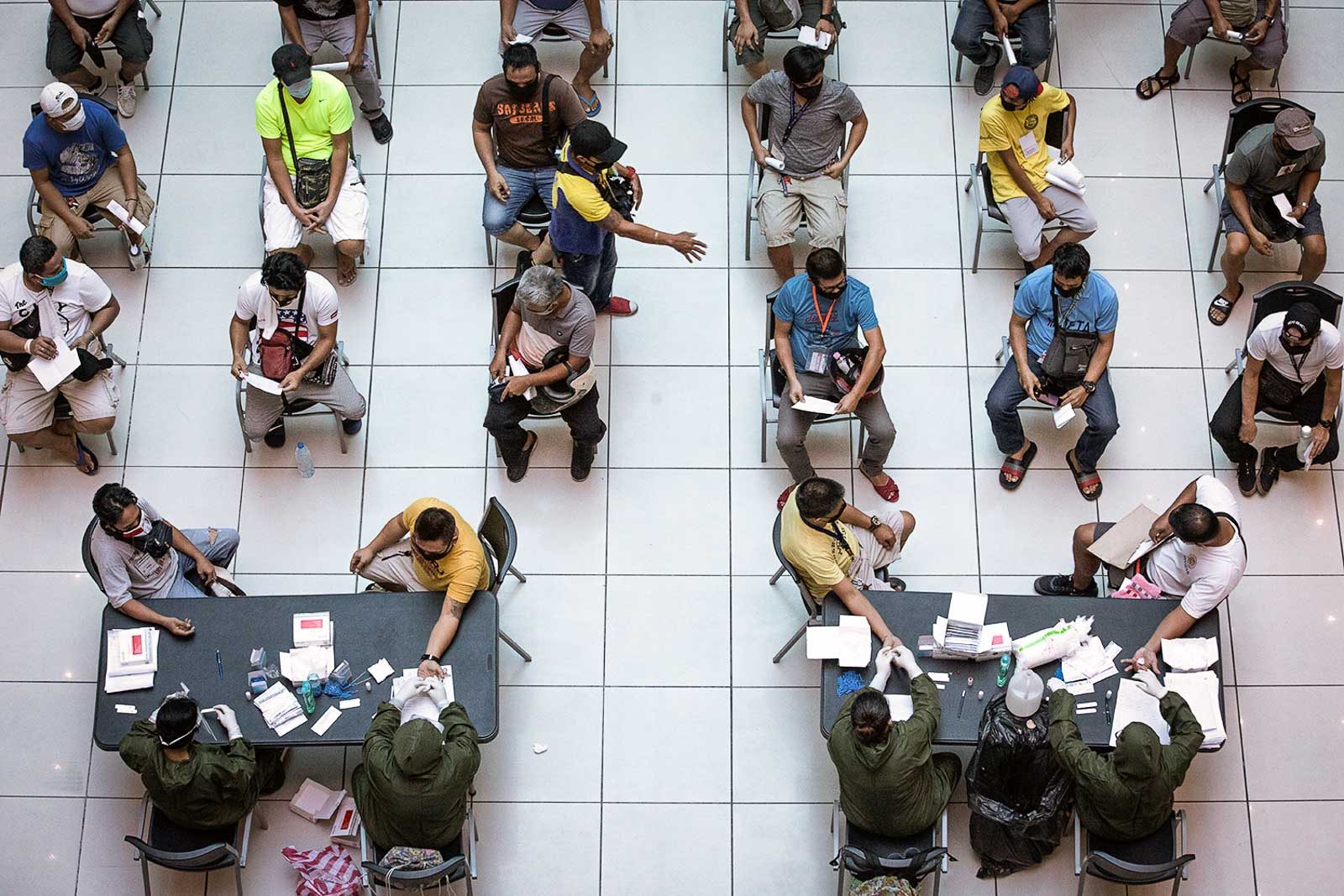SUMMARY
This is AI generated summarization, which may have errors. For context, always refer to the full article.

MANILA, Philippines – Several medical groups on Tuesday, May 19, warned local government units and employers against the use of COVID-19 antibody rapid tests as clearance to return to work, saying that it would be a “waste of resources” if used for diagnostics.
During a virtual press briefing, Dr Eddie Dorotan of the Action for Economic Reforms said that the real-time reverse transcription polymerase chain reaction (RT-PCR) test is still the gold standard for detecting infections.
“Madodoble lang tayo kung lahat ng manggagawa na babalik sa businesses nila o mga trabaho nila tapos ite-test natin ng rapid [antibody test] tapos [kapag] mag positive i-rerequire natin na i-test ulit. Sayang ang resources,” Dorotan said.
(Our efforts would just be doubled if we’re to test all workers returning to businesses using antibody rapid tests, and if their results are positive, we’ll have to require them to test again. It would be a waste of resources.)
What’s the difference? The RT-PCR test kits use actual swabs from patients and determine the actual presence of the coronavirus, while rapid test kits require the patient’s blood sample and can only detect antibodies.
Rapid antibody test kits yield faster results – approximately 45 minutes – compared to RT-PCR tests which have a turnaround time of 24 hours.
However, the Department of Health (DOH) said that swabs would still be taken from patients for confirmatory testing using the standards of the RT-PCR test.
Meanwhile, Dr Aileen Espina, technical committee representative of the Philippine Society of Public Health Physicians, said that making antibody rapid tests as a mandatory return-to-work clearance is not helpful at the moment.
“There’s an appropriate way of using antibody rapid test kits, especially in the public health context in areas such as seroprevalence and seroconversion studies,” Espina said.
According to Espina, the use of all tests whether as RT-PCR or rapid antibody should be “judicious and strategic and should be guided by thorough planning and implemented in the proper context.”
In a statement, the groups said that studies have shown that when rapid antibody tests are used on people showing no symptoms of COVID-19, there is a high incidence of false positive results.
They enumerated the adverse effects of having false positive results:
- Workers are unnecessarily forced into isolation.
- Healthcare workers, already undermanned, are forced to trace their contacts.
- The contacts are required to get quarantined unnecessarily.
- Workers who test positive may be falsely reassured that they are now immune from the disease.
- Companies trying to recover from economic devastation are forced to suffer further by paying for these unnecessary and potentially harmful tests.
In an earlier statement on March 30, Food and Drug Administration Director-General Eric Domingo said that while the DOH rejected an earlier recommendation to use rapid test kits, these kits can still be used in some cases, like in a community with a high number of suspected COVID-19 cases.
“Halimbawa, sa mga lugar na matagal nang umiikot ang virus at pinaghihinalaan na madaming tao na ang na-impeksiyon o sa mga pasyenteng may mga malubhang sintomas ngunit walang paraan na mabilisang magpa-test sa mga DOH laboratory,” Domingo explained.
(For instance, in areas where the virus has been spreading for some time now and it is believed that many have already been infected, or for patients with severe symptoms but are unable to get immediate tests done at DOH laboratories.)
Meanwhile, Dorotan said that national agencies should release a cohesive policy on antibody rapid tests not being needed as clearance for those returning to work.
“People are confused. The DOH, DILG (Department of Interior and Local Government), DTI (Department of Trade and Industry), and DOLE (Department of Labor and Employment) shoud be issuing one synchronized policy to avoid confusion,” Dorotan said in a mix of English and Filipino.
What’s the cheapest test to use? The groups said that rather than conducting rapid antibody tests, LGUs and employers should use the cheapest and most accurate test for fitness to return to work, which is the 14-day test.
“With this test, COVID-19 patients, suspects, and their contacts are required to be symptom-free for 14 days. This would serve as a much clearer indicator that workers are healthy and fit to return to work, without risking their own safety and the safety of the people around them,” the group said in a statement.
As of Tuesday, the Philippines recorded 12,942 cases of coronavirus infections, with 837 deaths and 2,843 recoveries. – Rappler.com
Add a comment
How does this make you feel?
There are no comments yet. Add your comment to start the conversation.